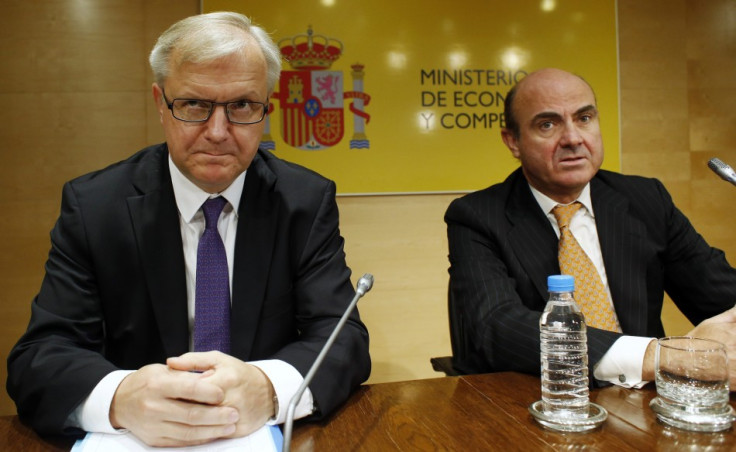Spain Studies ECB Aid Plan As EU Praises New Budget

Spain could be one step closer to becoming the fifth Eurozone member to seek formal financial assistance after its economy minister said the government was analysing aid plans from the European Central Bank.
Luis de Guindos told a news conference in Madrid Monday that he and Prime Minister Mariano Rajoy were looking closely at the terms and conditions linked to the ECB's programme of unlimited bond purchases just days after its controversial budget statement and bank audit results, which some analysts suggest could pave the way for a bailout worth as much as €100bn.
EU Economic and Monetary Affairs Commissioner Olli Rehn said Monday his office will give a formal reply to the Spanish budget plans in November, but praised the reforms laid out by Rajoy and de Guindos and said he was confident the pair would take the necessary steps to restore health to Europe's fourth-largest economy.
Spain published details of its long-awaited private auditing of the banking sector late Friday, with consultants Oliver Wyman and Roland Berger reporting a total capital need of around €59.3bn for it to survive the expected economic downturn. Around €40bn is expected to come from the rescue package previously arranged with Spain's EU partners in June. The remainder will be raised in private offerings by the banks themselves.
Rehn said the new capital, which would not increase Spain's overall deficit, would start flowing into Spain's banking sector by November.
The figures have helped steady a decline in Spanish stocks, which rose around 1.2 percent, and a rise in benchmark bond yields, which fell 7 basis points to 5.89 percent Monday.
The bond market rally in Spanish debt could be severely tested, however, with the results of the months-long review of Spain's investment grade credit rating by Moody's Investors Service, which could imminently cut Spain's Baa3 rating into junk status.
In its regular weekly Credit Outlook, Moody's analysts Maria Jose Mori and Alberto Postigo appeared unimpressed by the Spanish bank audit conclusions.
"The recapitalisation amounts published by Spain are below what we estimate are needed for Spanish banks to maintain stability in our adverse and highly adverse scenarios," the pair wrote. "According to our estimates, banks will need between €70 billion and €105 billion of capital to recognize their embedded losses upfront and still meet the 8% or 10% capital requirements established in previous legislation."
Independent US ratings firm Egan Jones slashed its own rating on Spain deeper into junk status Monday, the seventh cut so far this year, taking it to CC from CC+.
Key dates after the Moody's decision, which could come as early as today, will be the Eurogroup meeting of Eurozone finance ministes on 8 October, the European Leaders' Summit ten days later and regional elections in Galicia and the Basque Country on 21 October.
A earlier test for Spain may come if, as some analysts suspect, Spain opts for what's known as an Enhanced Conditions Credit Line, an EU aid package that does not involve explicit ECB bond purchases. Under certain conditions, Spain could arrange one-year loans from is single currency partners for as much as €100bn.
"(An) ECCL, while less embarrassing for the Spanish government and more digestible for the German Bundestag, may be viewed as too small," wrote Societe Generale economist Michala Marcussen.
"The challenge for Spain is to bring back fundamental foreign investors. Wining back their confidence is likely to prove a slow process leaving markets vulnerable to the more 'opportunistic' trades that appear to dominate at present."
Without the implicit or explicit backstop of the ECB, Spanish yields could rise sharply if Madrid can't engender the kind of investor confidence it will need to plug its 2013 fiscal gap; Spain needs to borrow around €207bn next year, and around half of that will come from the bond markets. The increased borrowing costs will then pile more pressure on the central and regional governments to cut public spending even further.
Regional anger at being asked to shoulder around 70 percent of the government's €13bn in new spending cuts and austerity measures has already led to an increase in political tensions with Madrid. Catalonia, Spain's richest and most populous region, will hold a snap election on 21 November that some say could fire the starting pistol on a messy constitutional battle for Barcelona's independence.
© Copyright IBTimes 2025. All rights reserved.





















